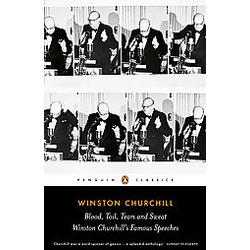Winston S. Churchill: Blood, Toil, Tears and Sweat: The Great Speeches – Book Review
 Winston S. Churchill: Blood, Toil, Tears and Sweat: The Great Speeches. David Cannadine (Editor, Introduction). Publisher: Penguin Classics, 2007. Paperback: 416 pages. $16.00.
Winston S. Churchill: Blood, Toil, Tears and Sweat: The Great Speeches. David Cannadine (Editor, Introduction). Publisher: Penguin Classics, 2007. Paperback: 416 pages. $16.00.
Great orators are not born with the gift of speaking but hone their skill over a period of years. Churchill was no exception.
World War II could have been called the Orator’s War. Four of its six major leaders—Benito Mussolini, Adolf Hitler, Franklin D. Roosevelt and Winston S. Churchill—used their gift of oratory to mobilize and lead their nation. But it was Churchill who led the rallying cry of freedom when the fascist powers appeared certain to triumph over Europe. His great speeches became the voice of resolve and determination among Britain and its Commonwealth allies to stop the spread of totalitarianism.
{default}Great orators are not born with the gift of speaking but hone their skill over a period of years. Churchill was no exception. In Blood, Toil, Tears and Sweat (BTTS), David Cannadine has selected various speeches to show how the great British statesman’s ability grew over the years.
The book’s introduction provides background information to help readers understand the material to be presented in its five chapters, each of which contains speeches based around a central theme. The first is "Mastering His Voice" and covers the years 1900–1917. This section contains Churchill’s first real public speech and includes his acceptance of blame for the Dardanelles fiasco of the Great War and the unfortunate call for the return of Lord Jackie Fisher as the First Lord of the Admiralty. Each speech shows how Churchill changed during the seventeen years of the period. Even when making a disastrous proposal, he was developing his voice. Even the opposition acknowledged the power of his words, if not his ideas.
Section 2 of BTTS becomes the voice of Churchill crying in the wilderness about how the United Kingdom had grown lax in preserving their prosperity and security. He warned about the growing Bolshevik menace in the former Tsarist Russia as a threat to the crown jewel of India by "A Seditious Middle Temple Lawyer" known as Mohandas K. Gandhi. Yet Churchill was looking beyond the needs of Empire to a threat that was emerging in Germany. It could be said that Churchill saw the vision of the Second War World as early as 1934 when, speaking before Parliament, he warned that the air defense of the UK was deficient. And as the Germans began to rearm; the British failed to follow up and fell behind; Churchill in 1936 predicted they needed to go forward with rearmament. The last speech in this chapter deals with the dismemberment of Czechoslovakia by the Munich Accords and how the accords were an unmitigated defeat for the democracies. Darkness loomed on the horizon for the world, and it would not be long in coming.
The third section of speeches in BTTS consists of the great early war speeches. Here was Churchill at his defiant best, the speeches that made him famous for his "sound bites." First, there is the moment with him forming the cabinet and promising nothing but "blood, tears, toil and sweat." The fall of France and the Battle of Britain get prominent play in this chapter, but to me Churchill’s best speech in this area was a tribute to Neville Chamberlain, a man with whom he had argued and fought with but in the end respected for his diligence and for working almost literally to his last day of life.
The next chapter deals with the world war, from the plea for weapons from the United States to fending off a notion of "no confidence" to honoring the memory of his friend and equal Franklin Delano Roosevelt. Even near the end of the war Churchill was exhorting the people of the Commonwealth to keep going and to not slack off. The book concludes with a random sampling of speeches after the war which includes the famous "Iron Curtain" speech.
BTTS is well edited and illustrated with photographs by David Cannadine. He takes cares to find not the only the best examples of Churchill’s speeches, but also to showcase some in which Churchill’s eloquence outshines his reasoning. He shows how Churchill could be giving a long, rambling speech and then suddenly deliver a phrase to remember. Honestly, it is these phrases—these "sound bites" if you will—that we remember more than the speeches themselves.
As a reviewer I read the book from cover to cover, but this was perhaps the least useful way to read this book. I recommended that a speech be read and digested before moving on. Take the lesson the editor is trying to give the reader and internalize it. BTTS is highly recommended for anybody wanting to look at Churchill beyond the sound bites or to anyone interested in the British politics of a bygone era. With a $16.00 price tag in the United States, this book is well within every reader’s budget.
ACG Intel
Winston Churchhill: Blood, Toil, Tears, Sweat: The Great Speeches


0 Comments
Trackbacks/Pingbacks